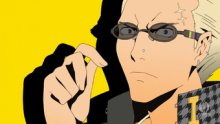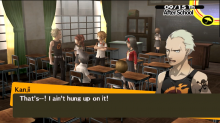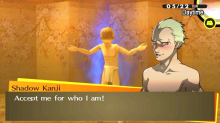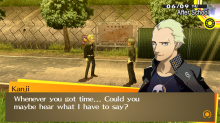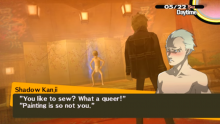As some of you may have noticed, a certain game has released recently that’s caused quite a stir over its depiction of LGBT people. I haven’t played either Last of Us game, and haven’t followed the story behind the game closely enough to have any thoughts on Neil Druckmann and co., so I’m not gonna talk about them specifically. But the whole situation’s got me thinking about LGBT representation in games, specifically in the context of another game that’s been in the spotlight recently due to a PC port: Persona 4.
I’m in favour of more representation for LGBT people in media, and I think Persona 4 does a great job in this department. But there’s a growing contingent of fans, even though they might be a vocal minority, that have put the game on blast lately for not going far enough. So I want to talk a little about what one of its characters, Kanji Tatsumi, means to me and why I think he’s a terrific example of LGBT representation. I’m hoping framing the discussion in this way will help keep some of the toxicity of the TLOU2 discussion at bay.
Let’s start with the basics—Persona 4 is a game about helping people deal with their repressed emotions. Each dungeon is a physical manifestation of their psyche, and the boss will be their Shadow, a distorted version of how they view the parts of themselves they can’t accept. Kanji’s dungeon is a men’s bathhouse; his Shadow is a lispy, flirtatious man running around in a towel. The message seems fairly obvious: Kanji is a closeted homosexual. But things aren’t as cut and dry as that.
I think this is where a lot of people’s issues with Kanji’s story come from. It feels a little like queerbaiting—teasing a queer character early on to get the attention of fans desperate for LGBT representation, only to backpedal later and say “Don’t worry guys, he’s not really gay!” I understand the frustration at that, but I think dismissing Kanji as a bad LGBT character simply because of it does a massive disservice to the story he tells about the complexity of sexuality.
Kanji’s family owns a textile shop, which leads to Kanji developing a knack for knitting and sewing at a young age. He gets mocked for being too girly and becomes isolated from the world, as neither sex can accept a man with such feminine interests. Partially to reaffirm his masculinity and partially to solidify the wedge between him and the world that rejected him, Kanji adopts an overly tough and brutish persona, replacing people’s contempt for him with fear. But that insecurity over his lack of masculinity stays embedded, and possibly manifests as his confused sexuality.
We first see Kanji’s attraction to men when he meets Naoto Shirogane, a woman who’s presenting as a man at the time. (Whether or not Naoto is another example of queerbaiting is a whole other can of worms I won’t get into.) After discovering she’s a woman, he continues being attracted to her. Of course, the root of his attraction to Naoto is that she’s one of the few people to accept him and make him feel valued or safe. But it leaves the question of his orientation murkier, leading to cries of noncommittal representation being lobbied against the game.
It’s important to note, however, that just because Kanji’s only love interest is female, that doesn’t stop him from being a queer character. Nothing definitive is ever stated about Kanji’s sexuality, and more crucially, Kanji seems just as fervent for answers as his fans. For example, when the prospect of Naoto entering a beauty pageant comes up, putting her in a position where she would dress more traditionally femininely than she normally does, Kanji begs her to do so as it would “clear up a few questions for [him].”
The idea of not understanding your own sexuality may seem alien to some people—whether you’re straight or gay or anywhere in between, you just like what you like, right?—but the complexity and range of feelings present can be hard to navigate as a teenager, especially for those who have had self-doubt instilled in them from isolating experiences as a youth.
Personally speaking, I consider myself mostly straight, as I’ve always had a slight attraction to men since I hit puberty. As silly as it sounds now, the underwhelming nature of that attraction drove me crazy as a kid, as it left me without a comfortable label and identity. Girls caught my attention everywhere I went, yet I couldn’t help but notice—and appreciate—men with some degree of regularity. I didn’t think I was gay, but those pesky thoughts reminded I wasn’t totally straight either. My conception of bisexuality at the time was that it was a purely equal, balanced attraction to either sex, so I couldn’t find any sense of identity there either. I would try to force thoughts into my head, to cut out the unwelcome ones and force myself to be either gay or straight. I didn’t care which one; I just wanted to know where I belonged.
This led to panic and rumination over my sexuality. I’d heard stories of men who wouldn’t come out of the closet until middle age, sometimes having a wife and kids, so I worried that I was gay and would waste much of my life in the closet. Maybe I was gay and I was just trying to suppress my feelings after growing up in a household with four older brothers who were constantly hurling gay jokes, usually at me. Or maybe I was straight and the vague attraction to men was implanted in me from internalizing those jokes. Maybe I was straight and was simply so desperate for acceptance and love that I’d be willing to settle for a man. I realize these ideas are ridiculous, but without any grounding sense of identity back then, I was floundering to simply understand who I was. After all, I’d never seen anyone going through what I was going through, so I must have been the only one. It must just be a problem with my screwy head.
I wish there was a more narratively satisfying conclusion to this story, but after a few years of this, more pressing concerns came up and I simply decided that I was happy to call myself straight and live that way, but to keep my mind open if the opportunity to explore those feelings ever arose. Curiously, as I stopped being so hard on myself about it, those feelings slowly subsided (though never disappeared), until, somewhat recently, a friend came out of the closet to me and all those feelings rushed back to me harder than I’d ever felt them before. After that, though, they’ve waned again. I’d be lying if I said I still didn’t have some lingering frustration at the lack of consistency in my sexuality, but I’m still taking things one day at a time.
I can’t help but wonder, however, if seeing a story like Kanji’s would have helped me back then. Some simple reassurance that things aren’t as easy for everyone as they seem sometimes. Something to let me know it’s okay to not understand yourself, as long as you can accept the answers you find in your own time. I realize there's another side to this coin, that there are gay gamers out there who needed to see someone like Kanji fully embrace his homosexuality and be out and proud, and I empathize with how hard it would be to see him heel turn and, conveniently, unknowingly be attracted to a woman the entire time. Regardless, I think the backlash to his story is a bit overblown, and even reductive to the case for LGBT representation. Sure, I'd love to see a fully out Persona character someday, but to pretend that Kanji doesn't represent the LGBT community is to ignore the huge, complex spectrum of sexuality that’s out there.
